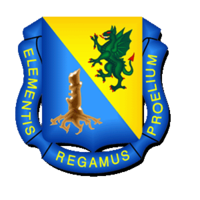United States Army CBRN School
| U.S. Army Chemical Biological Radiological and Nuclear School (USACBRNS) | |
|---|---|
 | |
| Active | 1918 – present |
| Country | United States |
| Branch | U.S. Army |
| Type | TRADOC |
| Garrison/HQ | Fort Leonard Wood |
| Motto(s) | Elementis regamus proelium (Let Us Rule the Battle by Means of the Elements or We rule the battle through the elements) |
| Colors | Cobalt Blue and Gold |
| Mascot(s) | Dragon |
| Commanders | |
| 30th Chief of Chemical/ Commandant | Colonel Antonio Munera |
| Regimental Chief Warrant Officer | Chief Warrant Officer 2 Jesse Deberry |
| Regimental Command Sergeant Major | Command Sergeant Major Henney Hodgkins |
| Notable commanders | LTG Thomas W. Spoehr, MG Leslie Smith, MG Peggy Combs, MG Maria Gervais, BG James Bonner |
The United States Army CBRN School, located at Fort Leonard Wood, Missouri, is the primary American training school specializing in military Chemical, Biological, Radiological, and Nuclear (CBRN) defense.[citation needed] Until 2008, it was known as the United States Army Chemical School.
Contents
1 Training Facilities
2 Official name change
3 Command
4 See also
5 References
6 External links
Training Facilities

Seal of the U.S. Army Chemical Corp
In accordance with U.S. Federal Law, Fort Leonard Wood, Missouri is designated the central location for all of the Department of Defense's CBRN Operations Training and home to the Chemical Corps Regiment. It was moved from Fort McClellan Alabama after the base was closed by the Defense Base Closure and Realignment Commission (BRAC) in 1999.
The Army CBRN School provides numerous courses for officers, Non-commissioned Officers and Initial Entry Soldiers. Numerous international officers also send students to train at the CBRN School. Additionally, the US Air Force, US Navy, US Coast Guard and US Marine Corps all also maintain training elements at Fort Leonard Wood who, in partnerships with the Army CBRN School, train their personnel in CBRN operations.
Fort Leonard Wood and the Army CBRN School also have facilities in which to conduct training, such as the Chemical Defense Training Facility (or CDTF) where military students from across the globe train and become familiar with actual nerve agents in realistic scenarios, and also conduct training with radiological isotopes and inert biological agents. The Edwin R. Bradley Radiological Teaching Laboratories is one of the very few radiological teaching laboratories licensed by the NRC in the Department of Defense. It provides a variety of training in radiological and nuclear defense under the supervision of credentialed scientists.
The newest facility at the CBRN School is the Lieutenant Joseph Terry CBRN Training Facility. Opened in November 2007, The 1LT Joseph Terry Chemical, Biological, Radiological, Nuclear (CBRN) Responder Training Facility occupies approximately 22.5 acres (91,000 m2) and provides a state-of-the-art[peacock term] CBRN Responder Training Campus for Inter-Service and other Agencies as requested. The US Army CBRN School is the lead for all DOD CBRN Response Training. This facility provides unmatched[peacock term] training opportunities in the fields of CBRN Consequence Management, Hazardous Materials Incident Response, Realistic training venues and other CBRN Response arenas as required. The CBRN School also provides training in Sensitive Site Assessment and Exploitation.
In addition to training, the CBRN School also develops doctrine for Operations, researches and develops materiel requirements, and conducts joint service experimentation as the Joint Combat Developer for the Department of Defense's Chemical and Biological Defense Program.
Official name change
On 11 January 2008, The U.S. Army Chemical School was renamed as The U.S. Army Chemical, Biological, Radiological and Nuclear School (USACBRNS). The name change was to encompass, in the title of the school, the wide range of training and expertise maintained by the U.S. Army Chemical Corps.
Command
As of June 15, 2018, the Commandant of the U.S. Army CBRN School is Brigadier General Andy Munera United States Army CBRN School. The Assistant Commandant is Colonel Thomas A. Duncan II. The Regimental Command Sergeant Major is RCSM Henney M. Hodgkins. The Regimental Chief Warrant Officer, is CCWO Robert A. Lockwood.[1]
See also
- Army Gas School
- Human experimentation in the United States
References
^ U.S. Army CBRN School web site. Retrieved June 16, 2018.
External links
U.S. Army CBRN School official website.
Fort Leonard Wood Army Training Center official website.
